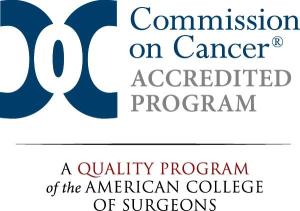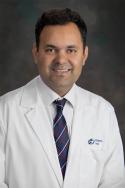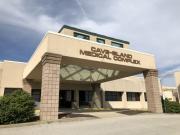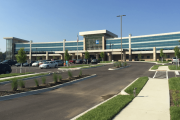Gastrointestinal Cancer
When you or a loved one are diagnosed with gastrointestinal cancer, it’s hard to know where to start, especially since proper care requires doctors working together across several specialties. Here, you can count on our skilled and caring experts to work closely with you, and with one another, to develop a treatment plan that addresses your unique diagnosis, needs and treatment goals. As an accredited Comprehensive Community Cancer Program, we offer nearly all the same options and technology you’d find at an academic medical center, just close to home.

What is Gastrointestinal Cancer?
Gastrointestinal cancer, which is one of the most common cancers in the world, develops along the gastrointestinal (GI) tract. There are several types of gastrointestinal cancer, including:
- Anal cancer
- Biliary cancer
- Colorectal cancer
- Esophageal cancer
- Gastric, or stomach, cancer
- Liver cancer
- Neuroendocrine tumors (NETs)
- Pancreatic cancer
Gastrointestinal Cancer Risk Factors
A risk factor is something that increases your risk for developing a certain type of cancer. Some, like those related to genetics, you can’t change. For example, GI cancer is more common in men than in women. But others, like risk factors related to lifestyle, you can.
Risk factors for GI cancer include:
- Age
- Alcohol use
- Gender
- Inherited syndromes
- Smoking
- Unhealthy diet
Gastrointestinal Cancer Symptoms
GI cancer typically doesn’t cause symptoms until the disease has advanced, and symptoms usually depend on where the cancer develops. For example, patients with esophageal cancer may have trouble swallowing, while those with colorectal cancer, may notice changes in bowel function.
Diagnosing Gastrointestinal Cancer
Most of the time, GI cancer is discovered when symptoms don’t go away and begin affecting someone’s quality of life.
Common tests for GI cancer include:
- Biopsy. Doctors remove small pieces of tissue that can be tested in a lab for cancer cells. If the biopsy cannot be completed through a colonoscopy or endoscopy, your doctor may recommend surgery.
- Colonoscopy. Doctors use a scope (camera) to check the inside of the colon and rectum for polyps.
- Endoscopy. Doctors use a small video camera to check the inner lining of the esophagus, stomach and small intestine for signs of cancer.
- Imaging tests. Doctors use X-rays, CT scans, MRIs, ultrasounds and PET scans to check for abnormal tissue in the digestive tract.
- Lab tests. Doctors use lab tests, such as blood counts, liver function tests and advanced genome testing to help diagnose GI cancers, depending on a patient’s symptoms.
Treating Gastrointestinal Cancer
When you’re diagnosed with GI cancer, you’ll have a whole team of experts at your side. Your care team may include medical, surgical or radiation oncologists, gastroenterologists and supportive care clinicians, such as dietitians, counselors and nurse practitioners. They will work together to create a treatment plan for your individual case, based on the latest research, to help you achieve the best outcome.
Sometimes, surgery is used to completely remove the tumor and surrounding tissue before beginning chemotherapy or radiation. Other times, surgery is used in conjunction with chemotherapy and/or radiation depending on the stage of disease. We may also use surgery or radiation to help prevent bleeding from the tumor or to help prevent organs from being blocked by tumor growth when cancer has spread too much to be removed completely. The recommended treatment plan and order of events will vary depending on the type and location of GI cancer.
In addition, we sometimes treat GI cancers with targeted therapy or immunotherapy. For example, some stomach cancers respond well to drugs that target the HER2 protein. Others respond to drugs that target the VEGF protein, which tells cells in the body, including cancer cells, to make new blood vessels, which tumors need to grow.










































